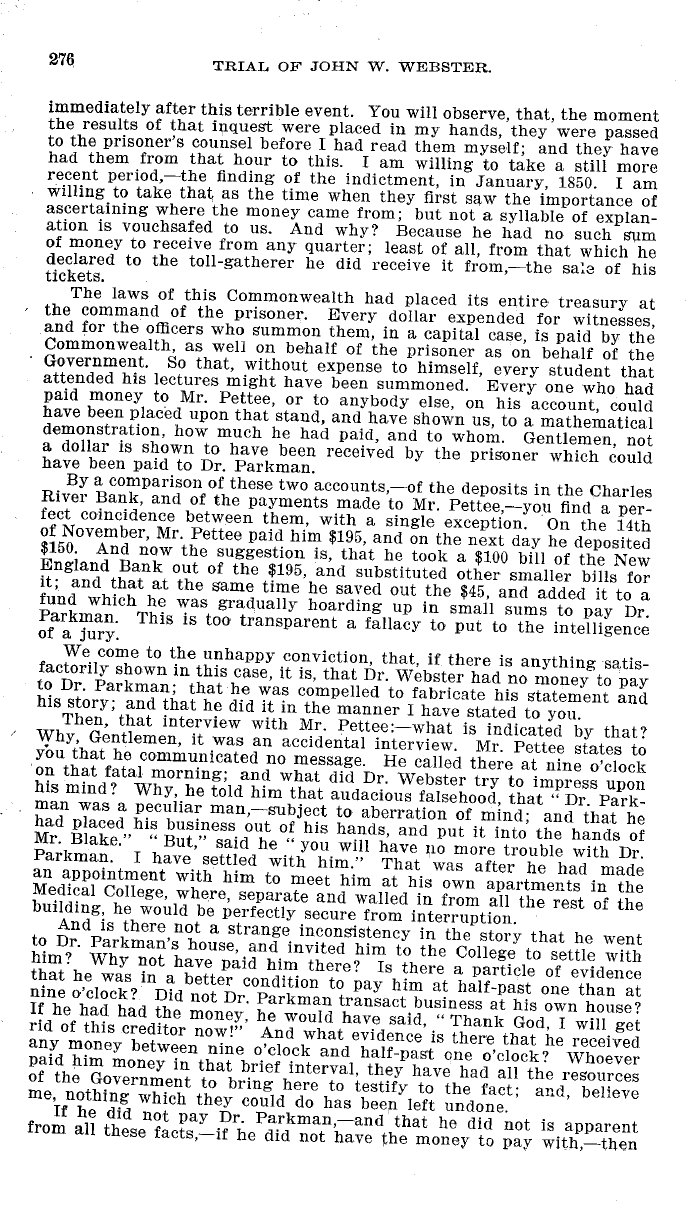|
276 TRIAL OF JOHN W. WEBSTER.
immediately after this terrible event. You will observe, that, the moment
the results of that inquest were placed in my hands, they were passed
to the prisoner's counsel before I had read them myself; and they have
had them from that hour to this. I am willing to take a still more
recent period,-the finding of the indictment, in January, 1850. I am
willing to take that as the time when they first saw the importance of
ascertaining where the money came from; but not a syllable of explan-
ation is vouchsafed to us. And why? Because he had no such sum
of money to receive from any quarter; least of all, from that which he
declared to the toll-gatherer he did receive it from,-the sale of his
tickets.
The laws of this Commonwealth had placed its entire treasury at
the command of the prisoner. Every dollar expended for witnesses,
and for the officers who summon them in a capital case, is paid by the
Commonwealth as well on behalf of the prisoner as on behalf of the
Government. So that, without expense to himself, every student that
attended his lectures might have been summoned. Every one who had
paid money to Mr. Pettee, or to anybody else, on his account, could
have been placed upon that stand and have shown us, to a mathematical
demonstration, how much he had paid, and to whom. Gentlemen, not
a dollar is shown to have been received by the prisoner which could
have been paid to Dr. Parkman.
By a comparison of these two accounts,-of the deposits in the Charles
River Bank, and of the payments made to Mr. Pettee,-you find a per-
fect coincidence between them, with a single exception. On the 14th
of November, Mr. Pettee paid him $195, and on the next day he deposited
$150. And now the suggestion is, that he took a $100 bill of the New
England Bank out of the $195, and substituted other smaller bills for
it; and that at the same time he saved out the $45, and added it to a
fund which he was gradually hoarding up in small sums to pay Dr.
Parkman. This is too transparent a fallacy to put to the intelligence
of a jury.
We come to the unhappy conviction, that, if there is anything -satis-
factorily shown in this case, it is, that r. Webster had no money to pay
to Dr. Parkman; that he was compelled to fabricate his statement and
his story; and that he did it in the manner I have stated to you.
Then, that interview with Mr. Pettee:-what is indicated by that?
Why, Gentlemen, it was an accidental interview. Mr. Pettee states to
you that he communicated no message. He called there at nine o'clock
on that fatal morning; and what did Dr. Webster try to impress upon
his mind? Why, he told him that audacious falsehood, that " Dr. Park-
man was a peculiar man,-subject to aberration of mind; and that he
had placed his business out of his hands and put it into the hands of
Mr. Blake." " But," said he " you will have no more trouble with Dr.
Parkman. I have settled with him." That was after he had made
an appointment with him to meet him at his own apartments in the
Medical College, where, separate and walled in from all the rest of the
building, he would be perfectly secure from interruption.
And is there not a strange inconsistency in the story that he went
to Dr. Parkman's house, and invited him to the College to settle with
him? Why not have paid him there? Is there a particle of evidence
that he was in a better condition to pay him at half-past one than at
nine o'clock? Did not Dr. Parkman transact business at his own house?
If he had had the money, he would have said, " Thank God, I will get
rid of this creditor now!" And what evidence is there that he received
any money between nine o'clock and half-past one o'clock? Whoever
paid him money in that brief interval they have had all the resources
of the Government to bring here to testify to the fact; and, believe
me, nothing which they could do has been left undone.
If he did not pay Dr. Parkman -and that he did not is apparent
from all these facts,-if he did not have the money to pay with,-then
|

